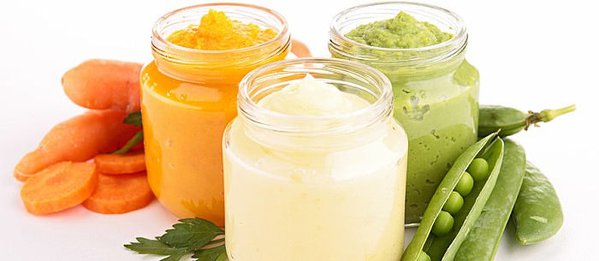Simple Steps to Transition Your Baby to Whole Foods

Transitioning to whole foods is such an exciting time for baby and the family. It marks a big milestone in life, and is a key part of development. When your baby is ready for food, remember to choose whole foods, preferably organic. The lower the ingredient count, the better. Avoid processed food products whenever possible. The best option for baby food is homemade, and truly this is not as daunting as it may sound. Babies eat small portions, so it’s easy to prepare large quantities of baby food to freeze (in single-serving portions) for the future. Getting in the habit of preparing all of baby’s food right away helps to create a routine of home-cooked meals for life.
Here are some simple rules to follow to make the transition smooth and easy:
- Bring in one new food at a time, and continue to serve that same food item for several (4+) days. This is gentle on the digestive system and allows parents to pick up on any food sensitivities early
- Wait to introduce grains, cereals, nuts, seeds and breads. The digestive enzymes needed to break down these complex carbohydrates and proteins are not fully functional until after two years of age (around the time that two-year molars come in). Wait until AT LEAST one year of age, if not longer
- Keep mealtimes simple and stress free. It’s important that the early experiences with whole foods are positive ones
- Vary the tastes and textures of foods you incorporate, so baby gets used to all different flavors and sensations that are associated with eating
- Let baby eat what you eat: Take a small portion of the same food you are preparing for the rest of your family (prior to seasoning) and puree it or cut it in baby-safe chunks
- To gradually change the consistency of foods, puree half and mash half of a meal for baby
- Choose organic whenever possible to minimize baby’s toxic load and reduce chance of negative reactions
Signs of Food Sensitivity or Intolerance
- Rash (eczema type is common)
- Redness around mouth
- Abdominal bloating
- Gas
- Diarrhea
- Constipation
- Fussiness
- Congestion
- Excessive spitting up of food
- Trouble sleeping
- Hyperactivity
- Lack of energy
Somehow, it has become common practice to introduce rice cereal to babies as a first food. This is NOT the best option, as babies do not have the proper enzymes to digest grains at this time. Starting with cereal has been linked to low nutrient and trace mineral absorption in babies.
Great First Foods
- Avocado
- Sweet potato
- Papaya
- Banana
- Organic, grass-fed, hormone-free meat (pureed)
- Carrots
- Beets
- Squash (acorn, pattypan, kobocha, butternut)
- Peas (mashed)
- Zucchini (especially yellow)
- Cooked apples
Fats Are Brain Food
Remember, fats are essential to brain development and proper growth, as well as muscle and bone health. Incorporating healthy fats such as avocado, olive oil, coconut oil, and ghee butter is essential to optimal health.
When to Introduce Water
Follow baby’s cues and pay attention to the environment. Babies can get all their hydration from breastmilk or formula for most of the first year. As you incorporate more solid, whole foods, begin working on sippy cup drinking as well. Also, ensure that you are giving your baby the purest water you can. Invest in a filtration system that removes metals, fluoride, and pesticides from water. I recommend the Berkey. Steer clear of store bought juices, which contain lots of processed sugar and preservatives. If you want to bring juice into your child’s diet, it is best to juice the produce yourself.
0 comments
Leave a comment
Please log in or register to post a comment